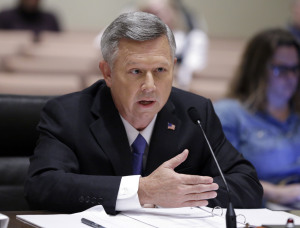Nebraska governor in hot seat over prison scandals

By Deena Winter | Nebraska Watchdog
LINCOLN, Neb. — Sen. Steve Lathrop accused Gov. Dave Heineman of putting so much pressure on his prison system by refusing to build more beds that his corrections staff illegally created a furlough program that allowed violent criminals to get out of prison.
That revelation came out during a sometimes intense hearing Wednesday where Heineman was summoned to testify about what he knew about several prison scandals.
ON THE HOT SEAT: Nebraska Gov. Dave Heineman testifies before a legislative committee that is investigating the state’s prison problems Wednesday.
Lathrop said the furlough program was created in 2008 and amended in 2011 to allow violent criminals to participate, and he contends it didn’t go through the proper process, with a public hearing unless it gets approved by the governor and attorney general before being filed with the secretary of state.
Heineman said he wasn’t aware of that and would look into it, and said it troubled and astonished him. Later, corrections staffers alerted reporters that the re-entry furlough program was created by internal policy and wasn’t subject to the Administrative Procedures Act.
Lathrop called the program “good time on steroids,” because in 2011, it was revised to allow 162 additional violent criminals on the streets, including five people in jail for second-degree murder, a couple for manslaughter and others for robbery, terroristic threats, firearm charges and first- and second-degree assaults.
“My reaction is I’m surprised the board of parole would approve them,” the governor said. “Given the problems we’re having with the department of corrections this is just one more revelation that makes you wonder what’s going on down there.”
However, Heineman disagreed with Lathrop’s assertion that prison crowding drove “good people” in the corrections department to ignore laws to cut the prison population.
“Does anybody care what the law requires?” Lathrop asked. “This overcrowding thing is running the show.”
“I need to go take a look at this and find out what occurred,” Heineman said. “I excuse no one for breaking the law.”
The governor was subpoenaed to talk about another program his prisons director, Mike Kenney, created that allowed a handful of prisoners to return home rather than serve the remainder of their sentences. By noon, they’d barely gotten to that topic.
They did get into the issue of why the corrections department allowed Nikko Jenkins to be released last year without treatment and despite his pleas to be committed to the state psychiatric hospital. After being held in solitary confinement for most of his 10-year sentence, Jenkins killed four Omahans within 11 days of his release.
Lathrop pressed the governor as to why behavioral health administrator Mark Weilage hasn’t been disciplined for withholding a 2013 psychiatric report that Jenkins was mentally ill, dangerous and should be committed to the state psychiatric hospital. Lathrop asked why the governor said during a press conference he didn’t think Weilage did anything wrong.
Heineman said he was arguing mental health professionals ought to be able to freely state their opinions. He said Weilage is being reviewed by Kenney and he can’t interfere in the process.
Lathrop also questioned the governor about a 2006 study that said the state needed to build about 1,400 prison beds or the prison system would go from 140 percent of capacity to 154 percent today.
The governor said his priority was to spend money on other needs, like education, and countered that nobody in the Legislature introduced a bill to build more prison beds, either. Lathrop contended lawmakers never saw the 2006 report until the committee got it through a subpoena; Heineman disagreed.
Several times, the governor said he had frequent conversations with Omaha Sen. Brad Ashford about the issue, and Ashford was OK with how the population was being managed.
“You’re trying to put it all on us when there are three branches of government,” the governor said.
Rather than build a new prison, the Heineman administration tried to manage the prison population by paroling and furloughing more prisoners.
Lathrop referred to 2011 documents indicating the corrections department decided to try to parole about 200 more prisoners per month to deal with “serious budget issues.” Heineman said Houston came up with the program.
Lathrop referred to a memo saying an agreement was signed with parole board chairwoman Esther Casmer, but the governor said he wasn’t aware of any written agreement. He did participate in a meeting with Casmer and former prisons director Bob Houston where they committed to trying to parole more people.
“They were discussing about finding more eligible for parole. I said ‘That’s great, I appreciate that,’ ” Heineman said.
Lathrop suggested the governor was pressuring Casmer by being at the meeting, but the governor said, “I didn’t view it that way at all. They came to me with this idea.”
However, Lathrop said Casmer and Houston talk to each other all the time, and questioned why the governor would need to be at the meeting.
“So what was the point in having a meeting with you in the room if not to apply pressure?” Lathrop asked.
Heineman said Casmer wouldn’t parole high-risk people, and Houston vowed not to either.
“I don’t want the bad guys out on the street,” the governor said.
Lathrop’s staff compiled statistics showing the number of paroles spiked from 982 in 2009 to 1,764 in 2013 and furloughs increased from 22 to 260.
The governor’s testimony resumes in the afternoon.
Follow Deena on Twitter at @DeenaNEWatchdog
Editor’s note: to subscribe to News Updates from Nebraska Watchdog at no cost, click here.







